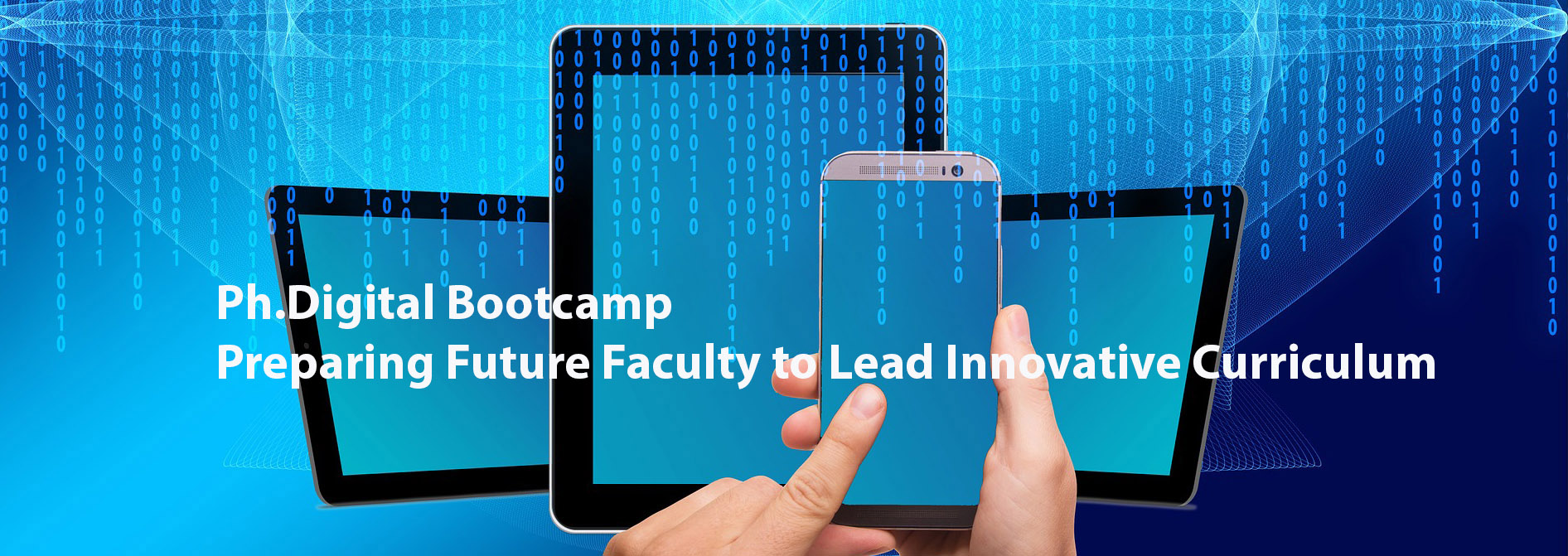
Instructor: Cindy Royal
July 4-8; Zoom July 8, 1-5pm CT
Introduction
In this module, we will read and discuss research on emerging digital topics. Please review the topics and familiarize yourself with the research trajectory.
Online Exercises & Materials
Objectives
- Analyze research on emerging digital issues
- Identify publication opportunities
- Discuss challenges to performing research on digital topics and concepts
- Discuss ways in which we can make research relevant to the media professions
We have talked about a lot of skills that you can bring into your program. But in those conversations, various topics that could be inspiration for research have emerged. Doing innovative research on new topics can be challenging, but there have been many recent developments that have improved the processes and quality of digital research. We’ll have a short discussion at the end of our Zoom this week that addresses these issues.
The main issue is understanding the digital environment so that research is meaningful, relevant and useful. That might mean:
- new methods
- new canons of theory
- new means of publication
- challenging long-standing, accepted conventions around each of these areas
There are many issues in society that technology touches, so there is great opportunity to study its effects. I have identified some research projects and articles that I think demonstrate innovative concepts and methods. You should be able to find these items in your libraries’ online services.
I have made some of these articles available via our Slack. I will remove the #journalarticles channel after the session ends, so download the resources you need.
Technology Firms Shape Political Communication: The Work of Microsoft, Facebook, Twitter, and Google With Campaigns During the 2016 U.S. Presidential Cycle, Political Communication, Daniel Kreiss & Shannon McGregor, 2018 – this article provides a fascinating look at how technology companies assisted the Presidential campaigns in 2016. I feel this type of work will need to be continued to better understand the broad reach of companies like Facebook and Google. And I also like how it was initially introduced in Politico, for the appreciation of a broader audience.
Location-based news in mobile news apps: Broadcast leads in geolocated news content, newspapers lag behind, Newspaper Research Journal, Amy Schmitz Weiss, 2018 – this article studied the way that news organizations are employing location-based services. In an increasingly mobile world, it will be important to understand how traditional media incorporates these and other features.
Amy is also the Research Chair for the International Symposium on Online Journalism. I highly recommend reviewing all their recent content and looking through their research. ISOJ always assembles the most provocative professionals and scholars, and it is a conference that any digital educator should put on their calendar!
Digital Journalism – Digital Journalism and its related publications Journalism Studies and Journalism Practice have been on the forefront of innovative research. Check out these articles on Materialising New Forms of Journalism, Reengineering Journalism: Product Manager as News Industry Institutional Entrepreneur, Algorithmic Transparency in News Media and Exploring Data Visualisations.
Media and Communication Journal – this open-access journal often does special issues on topics, providing a range of approaches. Check out their special issues on New Forms of Media Work, Social Media and Social Cohesion, Drones and Algorithms and Journalism.
Journalism and Mass Communication Quarterly did a special issue on Advancing Journalism and Communication Research: New Concepts, Theories, and Pathways. JMCQ also has a new article format called an invited forum in which topics are explored via inquiry rather than analysis. See the articles on AI and Journalism, Locative Media Ethics and Product Management in Journalism and Academia.
Journal of Quantitative Description: Digital Media – a new journal focused on quantitative description rather than causal claims.
Relevant Research
In addition to the items covered in the presentation, take a look at the MILab Journal, particularly the Relevant Research section. In this area, we do reviews of research that we think is particularly forward thinking and potentially relevant to the professions. Sometimes the work uses unique methods, sometimes it deals with emerging topics and it often can be useful to the professions, if broken down and “translated” for their usage. Let’s spend some time on the Zoom discussing if we should, and how we can make academic research that is professionally relevant.
In the MILab Journal, we also have articles that contain contributions from past PhDigital Fellows on the program and on work they have done inspired by the program and our faculty on online teaching challenges Take a look at the these links. Since it is accessible to post items online, I think we have an opportunity to broaden media scholarship beyond the walled gardens of a few journals. If you have anything you’d like to submit that meets our goal of exposing new forms of research and thought on innovation and emerging topics, let me know!
Here are some articles published in new places that allow research to reach a broader audience more quickly.
The Bots Beat: How Not to Get Punked By Automation, CJR by Nicholas Diakopolous
The Programmer Majored in English, Nieman Journalism Lab by Megan Garber – Nieman Lab is known for elevating emerging research topics to a broader audience. This article addresses the study I did with the NYT Interactive News Technology team in 2009. Note that this study was rejected by AEJMC. However, after presenting it at ISOJ, it received attention for being one of the first studies on the emerging role of data journalism. As you know, Nieman Lab also does the annual predictions which engage a bevy of big thinkers in exploring the items they think will be important in the future.
My article The Journalist as Programmer: A Case Study of the NYT Interactive News Technology Department was eventually published in the ISOJ Journal (download pdf).
Research centers are also the home to many relevant and meaningful research projects. The Tow Center for Digital Journalism has published many articles on emerging topics. Here are two:
Post-Industrial Journalism: Adapting to the Present (find pdf on Slack) by C.W. Anderson, Emily Bell and Clay Shirky. CW Anderson will join us on Slack during the Bootcamp. Anderson is also the co-editor of Remaking the News: Essays on the Future of Journalism Scholarship in the Digital Age.
Interactive Journalism: Hackers, Data and Code – Nikki Usher has written several books on digital topics.
The Art and Science of Data-Driven Journalism (find pdf on Slack) by Alexander Howard.
Teaching Data and Computational Journalism (find pdf on Slack) by Charles Berret and Cheryl Phillips.
Research Centers – here are a few other research centers doing important digital research.
Center for Media Engagement, The University of Texas.
Pew Research Center – Internet and Technology
Network of Centers – global directory of research centers (thanks for the suggestion, TJ Thomson)
Discussion
You have been introduced to many studies and topics in this module. How will you make sense of this in your own academic careers? Use the #scholarship channel.
- I’d like you to discuss the opportunities and challenges associated with researching emerging topics. What areas do you find most fruitful for your research agenda? Why? What are some ways that you might begin to measure or analyze these trends?
- What challenges do you see in terms of publishing this type of work? What venues do you think are most relevant? Can we and should we consider how to make research accessible to the profession? How does that fit into your goal of achieving tenure, and what are some strategies you think you will need to develop to deal with this environment? What recommendations do you have for journals who want to improve and modernize their approaches?
- This module is certainly not all-inclusive. There are many interesting and important studies and venues in which they are being published. Please provide links to any additional resources or studies you find relevant.
Module Evaluation
After each module, you will be asked to do an evaluation. Go to the link for the PhDigital 2022 Zoom Modules Evaluation and select the module you are reviewing. Please do this as soon as you can after the Zoom session.
